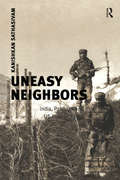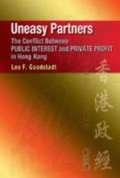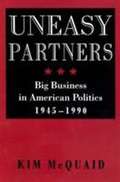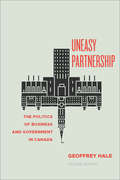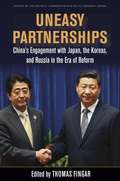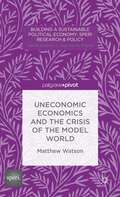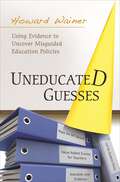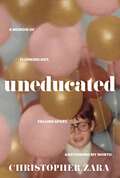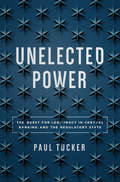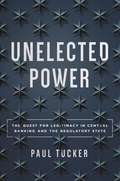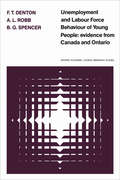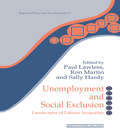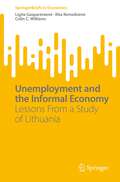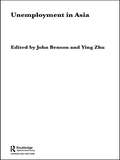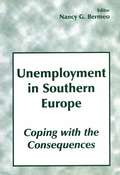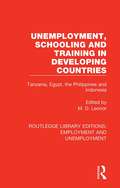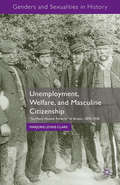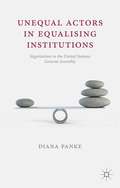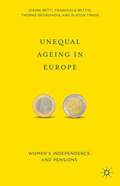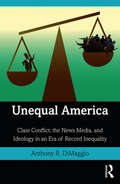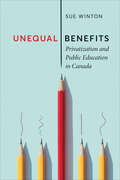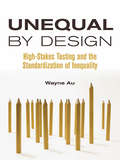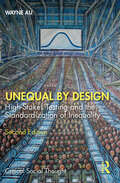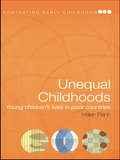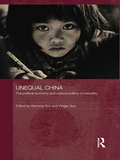- Table View
- List View
Uneasy Neighbors: India, Pakistan and US Foreign Policy (US Foreign Policy and Conflict in the Islamic World)
by Kanishkan SathasivamThis volume represents a comprehensive and detailed case study of the long-running conflict between India and Pakistan - primarily over the contested territory of Kashmir, and the involvement of the United States within that conflict. The book details the history of 'Partition', the critical event in the modern history of the subcontinent and the fundamental catalyst for the enduring rivalry between India and Pakistan. It provides a summary description and analysis of the characteristics - demographic, social-cultural, political, economic and military - of the three primary actors that are party to the conflict: the sovereign states of India and Pakistan and the territory of Kashmir. It explains the history of US policy toward India and Pakistan as individual countries as well as US policy toward the conflict between them, particularly in light of the Indian and Pakistani nuclear tests of 1998 and events since September 11, 2001. In addition, the volume also describes and analyzes the involvement of three other major extra-regional actors.
Uneasy Partners
by Leo F. GoodstadtIn 'Uneasy Partners,' Leo Goodstadt draws on his vast experience of government and business in Hong Kong to put forward a provocative and challenging account, part praise, part indictment, of how government and business in Hong Kong transformed a poor refugee community into one of the world's great cities and created a hugely successful economy.
Uneasy Partners: Big Business In American Politics, 1945-1990
by Kim Mcquaid"Businessmen are politicians in America," writes Kim McQuaid, "and politicians are businessmen. " Today, in areas as diverse as home mortgages, high technology, and Smart Bombs, the private and public sectors are working together to perform tasks that each is unable to do alone. In Uneasy Partners McQuaid surveys the close ties that have formed between big business and government in the period from World War II to the present. Government needs business, McQuaid explains, to make and implement key economic and business-related decisions. Business needs government to gain advantages over labor and markets. The defining characteristics of this business-government relationship form the focal point for each of the book's chapters. McQuaid first examines the 1945-60 transition period, discussing Eisenhower's domestic policies, foreign aid, and the oil market. He explores the rapid expansion of government under the Democratic administrations of the 1960s. He discusses the Republican retrenchment and the Reagan administration's pro-business agenda in the 1980s. Finally he assesses the legacy of the Reagan policies and evaluates the current U. S. position in the world economy.
Uneasy Partnership: The Politics Of Business And Government In Canada, Second Edition
by Geoffrey HaleIn this new edition of Uneasy Partnership, Geoffrey Hale examines the interdependent relationship between Canadian governments and businesses, considering governments’ multiple roles in the economy and their implications for the business environment. Hale provides an overview of the historical dimensions of Canada’s political economy and relations between government and business. Readers are invited to consider topics such as corporate power, the implications of Canada's economic structure, regional economic differences, the cross-cutting effects of globalization, and the role of interest groups in political and policy processes. In a thoughtful and well-researched style, Hale lays out how the partnership between business and government in Canada is an uneasy one—and one whose capacity to adapt to ongoing change is essential in an uncertain world.
Uneasy Partnerships: China’s Engagement with Japan, the Koreas, and Russia in the Era of Reform
by Thomas FingarUneasy Partnerships presents the analysis and insights of practitioners and scholars who have shaped and examined China's interactions with key Northeast Asian partners. Using the same empirical approach employed in the companion volume, The New Great Game (Stanford, 2016), this new text analyzes the perceptions, priorities, and policies of China and its partners to explain why dyadic relationships evolved as they have during China's "rise. "Synthesizing insights from an array of research, Uneasy Partnerships traces how the relationships that formed between China and its partner states--Japan, the Koreas, and Russia--resulted from the interplay of competing and compatible objectives, as well as from the influence of third-country ties. These findings are used to identify patterns and trends and to develop a framework that can be used to illuminate and explain Beijing's engagement with the rest of the world.
Uneconomic Economics and the Crisis of the Model World
by Matthew WatsonWhat has gone wrong with economics? Economists now routinely devise highly sophisticated abstract models that score top marks for theoretical rigour but are clearly divorced from observable activities in the current economy. This creates an 'uneconomic economics', where models explain relationships in blackboard rather than real-life markets.
Uneducated Guesses: Using Evidence to Uncover Misguided Education Policies
by Howard WainerWhat statistical evidence shows us about our misguided educational policiesUneducated Guesses challenges everything our policymakers thought they knew about education and education reform, from how to close the achievement gap in public schools to admission standards for top universities. In this explosive book, Howard Wainer uses statistical evidence to show why some of the most widely held beliefs in education today—and the policies that have resulted—are wrong. He shows why colleges that make the SAT optional for applicants end up with underperforming students and inflated national rankings, and why the push to substitute achievement tests for aptitude tests makes no sense. Wainer challenges the thinking behind the enormous rise of advanced placement courses in high schools, and demonstrates why assessing teachers based on how well their students perform on tests—a central pillar of recent education reforms—is woefully misguided. He explains why college rankings are often lacking in hard evidence, why essay questions on tests disadvantage women, why the most grievous errors in education testing are not made by testing organizations—and much more.No one concerned about seeing our children achieve their full potential can afford to ignore this book. With forceful storytelling, wry insight, and a wealth of real-world examples, Uneducated Guesses exposes today's educational policies to the light of empirical evidence, and offers solutions for fairer and more viable future policies.
Uneducated: A Memoir of Flunking Out, Falling Apart, and Finding My Worth
by Christopher ZaraIn this &“hilarious and heartbreaking...must-read memoir&” (Publishers Weekly), Christopher Zara breaks down his winding journey from dropout to journalist and the impact that his background had in the world of privilege. Boldly honest, wryly funny, and utterly open-hearted, Uneducated is one diploma-less journalist&’s map of our growing educational divide and, ultimately, a challenge: in our credential-obsessed world, what is the true value of a college degree? For Christopher Zara, this is the professional minefield he has had to navigate since the day he was kicked out of his New Jersey high school for behavioral problems and never allowed back. From a school for &“troubled kids,&” to wrestling with his identity in the burgeoning punk scene of the 1980s; from a stint as an ice cream scooper as he got clean in Florida, to an unpaid internship in New York in his thirties, Zara spent years contending with skeptical hiring managers and his own impostor syndrome before breaking into the world of journalism—only to be met by an industry preoccupied with pedigree. As he navigated the world of the elite and saw the realities of the education gap firsthand, Zara realized he needed to confront the label he had been quietly holding in: what it looked like to be part of the &“working class&”—whatever that meant.Book Riot's Eight New Nonfiction Books to Read in May Book Browse's Best Books of May 2023
Unelected Power: The Quest for Legitimacy in Central Banking and the Regulatory State
by Paul TuckerGuiding principles for ensuring that central bankers and other unelected policymakers remain stewards of the common goodCentral bankers have emerged from the financial crisis as the third great pillar of unelected power alongside the judiciary and the military. They pull the regulatory and financial levers of our economic well-being, yet unlike democratically elected leaders, their power does not come directly from the people. Unelected Power lays out the principles needed to ensure that central bankers, technocrats, regulators, and other agents of the administrative state remain stewards of the common good and do not become overmighty citizens.Paul Tucker draws on a wealth of personal experience from his many years in domestic and international policymaking to tackle the big issues raised by unelected power, and enriches his discussion with examples from the United States, Britain, France, Germany, and the European Union. Blending economics, political theory, and public law, Tucker explores the necessary conditions for delegated but politically insulated power to be legitimate in the eyes of constitutional democracy and the rule of law. He explains why the solution must fit with how real-world government is structured, and why technocrats and their political overseers need incentives to make the system work as intended. Tucker explains how the regulatory state need not be a fourth branch of government free to steer by its own lights, and how central bankers can emulate the best of judicial self-restraint and become models of dispersed power.Like it or not, unelected power has become a hallmark of modern government. This critically important book shows how to harness it to the people's purposes.
Unelected Power: The Quest for Legitimacy in Central Banking and the Regulatory State
by Paul TuckerHow central banks and independent regulators can support rather than challenge constitutional democracyUnelected Power lays out the principles needed to ensure that central bankers and other independent regulators act as stewards of the common good. Blending economics, political theory, and public law, this critically important book explores the necessary conditions for delegated but politically insulated power to be legitimate in the eyes of constitutional democracy and the rule of law. It explains why the solution must fit with how real-world government is structured, and why technocrats and their political overseers need incentives to make the system work as intended. Now with a new preface by Paul Tucker, Unelected Power explains how the regulatory state need not be a fourth branch of government free to steer by its own lights, and how central bankers can emulate the best of judicial self-restraint.
Unemployment and Labour Force Behaviour of Young People: Evidence from Canada and Ontario
by A. Leslie Robb Byron Spencer Frank DentonWhile the unemployment rate for young people has always tended to be well above the average, this tendency has been greatly accentuated in recent years. There is a large turnover in the youth labour force, and the employment of experience of those between the ages of eighteen and twenty-five has been marked by seasonal variations. This study discusses the factors which contribute to the high youth unemployment rate, examines the historical record of labout force participation, and provides some projections into the future.
Unemployment and Social Exclusion: Landscapes of Labour inequality and Social Exclusion (Regions and Cities #18)
by Ron Martin Sally Hardy Paul LawlessPersistent high employment and growing labour market inequality have become entrenched features of many European countries. This edited collection of papers focuses on the regional and local dimensions of these problems across the European union as a whole and, more particularly, in the UK. In the addressing the contemporary landscape of unemployment, social exclusion and public policy the contributors highlight several key themes, including:How the process of unemployment and social exclusion have an important local level operation. The increasing gender dimension and counts of unemployment to provide effective guides to the true scale of joblessnessThe need for more local-focused policy interventions to help reduce the problems of unemployment, employment insecurity and low incomes that now characterise many of the advanced countries.
Unemployment and the Informal Economy: Lessons From a Study of Lithuania (SpringerBriefs in Economics)
by Colin C. Williams Ligita Gasparėnienė Rita RemeikienėThis Brief examines the dynamics between the informal economy and unemployment rates, the causes of informality, its consequences and potential reduction measures at both the theoretical and empirical level. Using Lithuania as a case study, this book tests the assumption that participation in the informal economy is largely by the unemployed in emerging economies. Chapters present a systematic and comparative literature analysis, a quantitative survey of participation in the Lithuanian informal economy, especially among the unemployed, an expert evaluation involving representatives of municipalities in charge of the issues of employment, and a statistical analysis of the results. Challenging traditional narratives around the informal economy, this Brief is targeted at academic and postgraduate researchers studying labor economics, public economics, human resource management, industrial relations, and economic sociology.
Unemployment in Asia (Routledge Studies in the Growth Economies of Asia #58)
by John Benson Ying ZhuThe rate of economic change in East Asia over the past two decades has been astounding. High levels of growth have been experienced by a number of the region’s developing economies, centralized systems have developed large market sectors, Japan has suffered a prolonged downturn and the 1997 crisis plunged the region into economic turmoil. This volume presents an in-depth analysis of the effects of these changes on employment in the region. Chapters are devoted to market restructuring in China and Vietnam, the Asian crisis and recovery, and Japan’s business doldrums. The unique case of Malaysia – one regional economy that needs to import workers – is also brought into play, as is the example of high-tech Taiwan. Underpinning these case studies is a common theoretical framework and a strong structure for understanding. With its solid research the book focuses on a relatively unexplored aspect of one of the world’s most dynamic economic regions.
Unemployment in Southern Europe: Coping with the Consequences
by Nancy G. BermeoUnemployment is one of Southern Europe's most serious political problems. Though much has been written about unemployment's causes and cures, systematic attention to its consequences is lacking. This collection of original essays deals with the effects of unemployment on regimes, parties, immigrants, economies and families, highlighting the differences and the similarities among Southern European states and offering lessons about the profound human consequences of unemployment in general.
Unemployment, Schooling and Training in Developing Countries: Tanzania, Egypt, the Philippines and Indonesia (Routledge Library Editions: Employment and Unemployment #6)
by M. D. LeonorFirst published in 1985. Increasing doubt is being shed on the proposition that higher levels of education in developing countries are an unmitigated good. Unemployment among school leavers and university graduates is now a major problem. Some people argue that what is needed is a reform of primary education and the changing of attitudes to work; but many of the measures adopted have failed to achieve these goals and have only worsened the problem by increasing costs, making curricula less flexible and by increasing ‘mis-education’. This book examines the problems and the measures adopted to alleviate them in four important developing countries. It provides many new research findings and much new thinking and concludes with suggestions for improving policies.
Unemployment, Welfare, and Masculine Citizenship
by Marjorie Levine-ClarkThis book examines how, from the late nineteenth century through the 1920s, British policymakers, welfare providers, and working-class men struggled to accommodate men's dependence on the state within understandings of masculine citizenship.
Unequal Actors in Equalising Institutions
by Diana PankeThis book explores the interplay between formal rules and real world differences, questioning to what extent size-related capacities between states matters for the dynamics and outcomes of negotiations taking place in the United Nations General Assembly, an institution that strongly reflects the one-state, one-vote principle.
Unequal Ageing In Europe
by Gianni Betti Francesca Bettio Thomas Georgiadis Platon TiniosUnequal Ageing in Europe explores the gender pension gap across the 28 member states of the European Union, plus Iceland and Norway.
Unequal America: Class Conflict, the News Media, and Ideology in an Era of Record Inequality
by Anthony R. DiMaggioThis book examines Americans and their beliefs about the class divide in the United States. It argues that Americans’ beliefs about class and the economic divide develop through a multistep process. Economic affluence influences the development of worldview, measured in terms of ideology, partisanship, and self-identified class consciousness. Class consciousness in turn affects how people look at political and economic issues. This book is intended for scholars and students at every level who study inequality from a political, economic, or sociological position, along with general readers with a growing interest in and awareness of the effects of inequality on our democracy, especially in the wake of the Covid-19 pandemic, the resulting economic contraction, and the protests over racial injustice erupting throughout the world in 2020.
Unequal Benefits: Privatization and Public Education in Canada (UTP Insights)
by Sue WintonDrawing on research from across Canada and beyond, education policy expert Sue Winton critically analyzes policies encouraging the privatization of public education in Canada. These policies, including school choice, fundraising, fees, and international education, encourages parents and others in the private sector to take on responsibilities for education formerly provided by governments with devastating consequences for the democratic goals of public education. Unequal Benefits introduces traditional and critical approaches to policy research and explains how to conduct a critical policy analysis. Winton explains the role policy plays in supporting and challenging inequality in the pursuit of a strong democracy and the public school ideal. In these idealized education spaces, policy decisions prioritize collective needs over private interests, which are made in public by democratically elected officials, and, more importantly, every child is able to access high quality education programs and enjoy their benefits at no cost. Written for parents, educators, policymakers, and other interested citizens, Unequal Benefits sheds light on how to participate in efforts to resist educational privatization and achieve the public school ideal across Canada.
Unequal By Design: High-Stakes Testing and the Standardization of Inequality (Critical Social Thought)
by Wayne AuUnequal By Design critically examines high-stakes standardized testing in order to illuminate what is really at stake for students, teachers, and communities negatively affected by such testing. This thoughtful analysis traces standardized testing’s origins in the Eugenics and Social Efficiency movements of the late 19th and early 20th century through its current use as the central tool for national educational reform via No Child Left Behind. By exploring historical, social, economic, and educational aspects of testing, author Wayne Au demonstrates that these tests are not only premised on the creation of inequality, but that their structures are inextricably intertwined with social inequalities that exist outside of schools.
Unequal By Design: High-Stakes Testing and the Standardization of Inequality (Critical Social Thought)
by Wayne AuThis new edition of Unequal By Design: High-Stakes Testing and the Standardization of Inequality critically examines the deep and enduring problems within systems of education in the U.S., in order to illuminate what is really at stake for students, teachers, and communities negatively affected by such testing. Updates to the new edition include new chapters that focus on: the role of schools and standardized testing in reproducing social, cultural, and economic inequalities; the way high-stakes testing is used to advance neoliberal, market-based educational schemes that ultimately concentrate wealth and power among elites; how standardized testing became the dominant tool within our educational systems; the numerous technical and ideological problems with using standardized tests to evaluate students, teachers, and schools; the role that high-stakes testing plays in the maintenance of white supremacy; and how school communities have resisted high-stakes testing and used better assessments of student learning. Parents, teachers, university students, and scholars will find Unequal By Design useful for gaining a broad, critical understanding of the issues surrounding our over-reliance on high-stakes, standardized testing in the U.S. through up-to-date research on testing, historical and contemporary examples of the struggles over such tests, and information about how testing has fostered the privatization of public education in the U.S.
Unequal Childhoods: Young Children's Lives in Poor Countries (Contesting Early Childhood)
by Helen PennAn expert in her field, Helen Penn discusses the inequalities between and within countries of childhood poverty and how this poverty is recognized and defined through the following case-studies: Kazakhstan - once part of the Soviet Union Swaziland - a country in Southern Africa devastated by HIV and AIDS Himalayan India Brazil - one of the world's most unequal countries. These four case studies illustrate the diversity and complexity of the responses to the attempts to globalise childhood and highlight the need to address the inequalities of childhood experience.
Unequal China: The political economy and cultural politics of inequality (Routledge Studies on China in Transition)
by Wanning Sun Yingjie GuoEconomic development and a dramatic improvement in living standards in many parts of the People’s Republic of China during the past three decades of economic reforms have been hailed by the Chinese Communist Party and many commentators in the international arena as the most spectacular achievements in the history of humanity. However, three decades of economic reforms have also transformed China from one of the world’s most egalitarian societies into one of the most unequal. This book offers a comprehensive account of inequality in China from an interdisciplinary perspective. It both draws on, and speaks to, the existing body of literature that is generated mainly in the fields of economics and sociology, while extending its scope to also examine the political, social, moral and cultural dimensions of inequality. Each chapter addresses the question of inequality from a specific context of research, including housing, health care, social welfare, education, migration, land distribution, law, gender and sexuality. Moving beyond traditional socio-economic theories, the contributors to this volume explore a wide range of social, political, economic and cultural practices that result from, as well as further entrench, the inequalities in Chinese society. Importantly, the essays in Unequal China probe the hidden causes of inequality - namely, the role of state power and the importance of culture - and underline how both state power and cultural factors have a key part to play in legitimating inequality. With an innovative approach that moves beyond the economic and sociological roots of inequality in China, this volume is a welcome addition to what is a growing field of study, and will appeal to students and scholars interested in Chinese culture and society, Chinese politics and Asian social policy.
